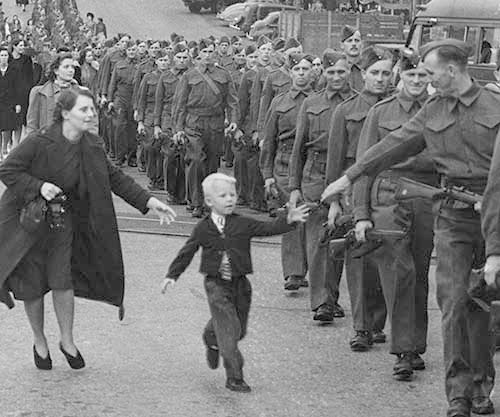Lorinda Strang holds close to the memory of what war did to her family
If you walk into my office, you will see the photo known as “Wait For Me Daddy,” hanging on the wall. That photo shows my Dad as a five year old running to my Grandfather, Jack, hand reached out calling “Wait for me, Daddy,” as he marched down Eighth Street in New Westminster with the British Columbia Regiment on October 1st 1945. The photo was picked up by Life magazine and hung up in every school in BC during the war. You can even see a life sized sculpture of it displayed at the foot of Eight Street In New Westminster; at the Canadian War Museum in Ottawa; on a two dollar coin, and a postage stamp. Warren, known as “Whitey,” was enlisted to help sell war bonds, with the slogan, “Buy a war bond and help bring my Daddy home.” My Dad says that the photo captures the emotions of families being ripped apart by war.
The British Columbia Regiment was first sent to Nanaimo, and then to both France and the Netherlands. They returned home at the end of the war. The photographer who captured the goodbye photo years earlier was on-hand for his father’s return. Jack did not want pictures, but allowed one quick photoshoot of being re-united with his son to be captured.
Today, my Dad, Whitey Bernard lives in Tofino, BC.
Brian Biddlecombe remembers his Grandfather, William Biddlecombe
My Grandfather served with the 7th Hussars in the Boer War in 1901 and emigrated to Canada in 1906. He would later serve in World War I with the Seaforth Highlanders at Vimy. He was wounded at Passchendaele.
He wrote home to say that a shell had exploded near by, killing several people.
“Blew me kilt off, and wounded me in the buttocks!”
He wore his kilt throughout the war.
Frazer Elliot remembers his Grandfather, Alec Elliot
My grandfather, Alec Elliott, was a pilot in the Royal Air Force during World War Two.
He was posted to Penhold, Alberta, where he trained Commonwealth pilots how to fly. He met my grandmother there, married and had my father in 1943, before being posted back to England in 1944 for operational duties. My grandmother and father followed him across the Atlantic in a convoy.
In January 1945, during his eleventh mission flying Halifax bombers over Germany, he was attacked by a German night fighter and his aircraft lost three of its engines. They tried to make it back behind Allied lines to land but soon realized they couldn’t. Alec gave the order to bail out, but his tail gunner’s radio didn’t work, and he waited too long until he had confirmation that the gunner was gone to bail out safely himself - pilots are always the last ones to leave. His crew parachuted into the German-occupied Netherlands and survived - some in POW camps, others evaded capture with the help of the Dutch Resistance - but Alec was found dead next to the wreckage of his Halifax in a soccer field in Haarle with his parachute partially deployed.
He was 25 years old.
Kiah Grant shares a family history, relatively new for her
My grandfather, John Grant, never spoke about his time serving in the Navy during World War II. Long after his death, I connected with the descendants of my father’s brother on Ancestry.com, and they pulled out a rescued shoe box full of letters that told the story of both brothers.
Hank, my grandfather’s brother, survived the first wave of Dieppe as part of the Canadian Infantry Corps. Three days after wading ashore, he was by a mortar shell that took a chunk of his scalp off. Eventually, Hank made it to safety where he was treated and visited by his brother, my Grandfather, John.
John was in the navy and found himself aboard the HMS Prince of Wales as it sailed into Placentia Bay, NL with Prime Minister Winston Churchill and President Franklin D. Roosevelt. He stood and watched as the leaders shook hands, sealing the deal on the agreement that would bring the United States into the war four months later.’
Unfortunately, my Grandfather and his brother had an argument and lost touch after the war. I am grateful for my family’s rec-connection and understanding of history it has brought.
Basia Lieske remembers the joy of her family being re-united
My father, George Liszkowski, fled Poland when he was 12 years old, with his older sister, Danka (she was 16), during the Second World War. They managed to make it to Portugal where they caught a boat that took them north. They settled in Scotland (Edinburgh) and waited for their father and older brother, both of whom were fighting in the war.
Before the war, my grandfather had established an underground movement in Poland against the Nazis. So the family was very much in trouble and we’re being hunted. The whole ordeal was very frightening for my father. He eventually wrote the story, had it published and it is now in the British War Museum.
This photo was taken the day they all were all reunited in Scotland. It was a very happy day.



